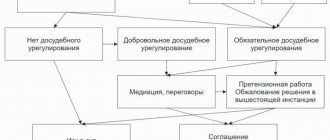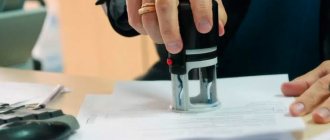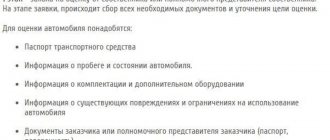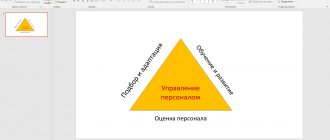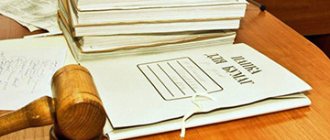Experienced lawyers and jurists pay close attention to collecting and presenting evidence in court. No matter how confident the party in the case is that they are right, the main thing is to convince the court of this, therefore evidence in court in a civil case is of great importance.
In Russia, the civil process is adversarial, which means that the parties themselves must confirm the circumstances to which they refer, provide evidence to the court themselves, and if it is impossible to obtain it on their own, petition for the court to request evidence.
We will collect evidence in your case
We are lawyers, so we have the ability to send a lawyer's request.
Failure to provide information to a lawyer entails liability in accordance with the Federal Law “On Advocacy and the Bar of the Russian Federation”/
Get help
Types of evidence in civil proceedings
Evidence may include:
- written sources (documents, contracts, receipts, certificates, letters, etc.)
- material evidence (poor quality item in the process of protecting consumer rights, a car damaged as a result of an accident),
- explanations of the participants in the proceedings,
Because court hearings are recorded and recorded, your explanations could easily be used against you by the other side, so consult with your attorney before speaking and answering questions, and be careful what you say in court.
- expert opinions,
- specialist consultations,
- witness's testimonies,
- audio and video recordings,
- other evidence.
Types of evidence
Witness's testimonies
Based on Art. 70 of the Code of Civil Procedure, persons who have information relevant to the case may disclose it in court. A witness can testify not only during the hearing, but also at his place of residence if he cannot appear for a good reason. This could be illness, disability or old age. The Code does not allow calling as witnesses:
- representatives or defenders in civil or administrative proceedings;
- judges or jurors participating in the discussion of the circumstances of the case;
- clergy who received information during confession.
Written and physical evidence
In accordance with Art. 71 of the Code of Civil Procedure, written evidence can be contracts, reports, certificates, business correspondence, and other documents, including those received by email. These also include court decisions, rulings and sentences.
Provide evidence in original or certified copy. If a copy is submitted electronically, the court may require the original. Documents may be returned to the person who provided them upon his written request after the final decision comes into force.
Physical evidence is items that can be used to establish the circumstances of the case. They are stored either in court or at their location if it is impossible to deliver them. All items must be inspected and described, photographed and sealed if necessary.
Audio and video recordings
According to Art. 77 of the Code of Civil Procedure, persons who present this evidence must indicate under what circumstances, by whom and when the audio recording or video filming was made. They are stored in court in compliance with their unchanged condition. Storage media are returned only in exceptional cases. At the request of a person participating in the case, he may be given copies made at his expense.
Expert opinion
If, in the process of studying the case materials, questions arise that require special knowledge in any area, the court appoints an examination. Persons who participate in the case have the right to be present during its conduct. An expert's opinion is indirect evidence of the presence or absence of certain circumstances or facts, but it can provide clarity when studying the information.
In accordance with paragraph 3 of Art. 86 of the Code of Civil Procedure, the results of the examination do not have a pre-established priority for the court and are assessed only in conjunction with other information.
Properties of evidence in court
The evidence in the case must be sufficient and must not contradict each other.
Ultimately, it is up to the court to determine whether there was enough evidence and whether this or that fact was proven. If there is insufficient evidence, then the court will consider this fact unestablished or, conversely, not refuted by the other party. The court has the right to invite the parties to provide additional evidence.
Of course, the evidence must be reliable . Any party to the dispute has the right to declare falsification of documents by the other party and demand the appointment of an expert examination.
Each piece of evidence has two most important features: relevance and admissibility .
To be relevant, they must directly or indirectly confirm or refute the circumstances of a particular case.
For example, when considering a claim for reimbursement of the cost of inseparable improvements to the rented premises, receipts for the purchase of building materials may be considered unacceptable evidence if it is impossible to establish exactly where and in what quantity these materials were used, whether they were used to repair the rented premises (there is no estimate for repairs premises, expert opinion, contract, etc.).
For a circumstance to be admissible, it must comply with the requirements of the law.
For example:
when selling real estate, the consent of the spouse must be given in notarial form (Article 35 of the Family Code), therefore, confirming the consent of the wife or husband is possible only with written, notarized consent;
A loan agreement between individuals for an amount of more than 10,000 rubles must be in writing, if you agreed on a loan orally, then by virtue of Art. 162 of the Civil Code of the Russian Federation, the testimony of witnesses will not be accepted as evidence in court, but you can provide other evidence (receipt, bank account statement, video materials, correspondence in instant messengers).
In addition, admissible evidence must be:
- received in compliance with mandatory requirements (legislation on commercial, banking, tax secrecy, personal data),
- drawn up in accordance with the law (for example, the contract must have the signature of an authorized person, and government documents must have a corresponding seal).
But the evidence is not real!
IF THE EVIDENCE IS FAKE, FILE A REPORT OF Falsification
Each of the parties to the arbitration process must prove the circumstances that it refers to as the basis for its claims and objections2. In turn, according to Art. 71 of the Arbitration Procedure Code of the Russian Federation (hereinafter referred to as the Arbitration Procedure Code of the Russian Federation), the court evaluates evidence according to its internal conviction. Therefore, he must conduct a complete, comprehensive, objective examination of the evidence and evaluate each of them, including for reliability. Evidence is considered reliable if, as a result of its verification and research, it turns out that the information contained in it corresponds to reality3.
If you are confident that the evidence is falsified, file a falsification claim. It aims to exclude the relevant evidence from the evidence in the case. In such conditions, the party that presented it will have no choice but to base its arguments and objections on other evidence4.
The importance of verifying a statement about falsification of evidence is established by clause 16 of the Resolution of the Plenum of the Supreme Court of the Russian Federation dated October 31, 1995 No. 8. It notes that in the administration of justice the use of evidence obtained in violation of federal law is not allowed, and this is a constitutional norm5.
Filing an application for falsification of evidence is regulated by the provisions of Art. 161 Arbitration Procedure Code of the Russian Federation. The Arbitration Procedure Code of the Russian Federation does not provide for restrictions that exclude the possibility of filing such a statement. The Arbitration Procedure Code of the Russian Federation does not contain any special requirements for the form of the application, therefore it is submitted at the stage of the trial in any written form, which is necessarily reflected in the minutes of the court hearing.
There is a small nuance: the court has the right to consider an oral statement about falsification of evidence, without fail indicating this in the protocol, and explain to the applicant the right to submit a written statement6.
If the person who presented the evidence has expressed his consent, the court excludes the disputed evidence from the evidence in the case. But, as a rule, it raises an objection. And in this case, the arbitration court takes measures to verify the authenticity of the statement about falsification of evidence. He may, for example, order an examination or request other evidence. He does not have the right to refuse to verify an application on the grounds that the party, for example, did not demand the appointment of an examination of evidence7.
In general, the procedure for considering an application for falsification of evidence consists of several stages:
- Filing an application for falsification of evidence8.
- The opinions of other persons participating in the case are heard9.
- The court explains the criminal legal consequences of such a statement10.
- The court excludes the contested evidence with the consent of the person who presented it from the evidence in the case11.
- The court verifies the validity of the statement of falsification of evidence if the person who presented this evidence has raised objections regarding its exclusion from the evidence in the case12.
- The results of consideration of the application are entered into the minutes of the court session13.
However, be careful: the result (and sometimes the purpose) of filing a statement of falsification may not only be the exclusion of the disputed evidence.
This procedure is often used as a means of delaying the judicial process, since filing an application for falsification of evidence may entail the appointment of examinations, the request for other evidence, or other measures. But such deliberate behavior to delay the judicial process can be regarded as disrespect for the court and pressure on it, impeding the administration of justice14. Let's look at how the court determines whether evidence is falsified or not.
EXAMINATION WILL GIVE AN ANSWER
The most popular way to check evidence for falsification is examination. However, it is appointed by the court, as a rule, in cases where issues of law cannot be resolved without assessing the facts, the establishment of which requires special knowledge15. Therefore, along with a statement about falsification of evidence, a request for an examination can also be submitted16.
The expert opinion is one of the evidence in the case and is evaluated along with other evidence. The purpose and procedure for conducting the examination are regulated by Art. 82 and 83 of the Arbitration Procedure Code of the Russian Federation.
#FOOTNOTE# However, expertise is not always necessary. In many cases, the court tries to check evidence for falsification in other ways - and the law allows this17.
OTHER WAYS TO CHECK A STATEMENT OF Falsification
Verification of a statement of falsification can be carried out by examining and evaluating other evidence presented in the case file - both direct and indirect18, including witness testimony19.
A complete examination of the evidence implies that the materials available in the case are sufficient for the court to be able to evaluate all the evidence available in the case in totality and in interrelation. The examination of materials provides a complete analysis of all evidence20.
Often, the authenticity or forgery of evidence can be determined through routine document verification. Therefore, if the verification of evidence does not require special knowledge in any narrow area, consideration of the evidence in connection with the circumstances of the dispute is sufficient. When checking evidence in conjunction, evidence declared as falsified is subject to evaluation along with other evidence involved in the trial21.
It happens that when comparing the evidence available in a case in order to verify the statement of falsification of evidence, the court comes to the conclusion that the presence or absence of the specified evidence simply does not matter for the case22.
If at a court hearing it is stated that signatures on documents have been falsified, the court may, without ordering a forensic examination, verify the statement by taking samples of a personal signature and comparing them with the signature contained in the disputed document23.
IS IT POSSIBLE TO FILE A CLAIM FOR FALSIFIATION OF EVIDENCE DURING AN APPEAL?
An allegation of tampering with evidence is usually filed in the trial court. The appellate court has no grounds for considering the application for falsification of evidence that was presented in the first instance court, since this violates the requirements of Part 3 of Art. 65 of the Arbitration Procedure Code of the Russian Federation on the disclosure of evidence before the start of the consideration of the dispute. However, if, due to objective reasons, you were not aware of previously determined facts, such a statement may be considered on appeal. Such clarifications were given by the Plenum of the Supreme Arbitration Court of the Russian Federation back in 200924. But you must justify the impossibility of filing such an application with the court of first instance and attach relevant evidence to the application25.
If, for example, it turns out that the court of first instance did not take the necessary measures to verify the statement of falsification, and the establishment of the fact of reliability is essential for the case, the appellate court satisfies the corresponding statement of the party26.
IF A STATEMENT FOR Falsification HAS NOT BEEN FILED...
To no, as they say, there is no trial. The law does not allow the arbitration court, on its own initiative, to exclude a document from evidence in the case. The conclusion that a document has corrections that significantly affect its content, or that it contains a signature that does not correspond to the signature of the same person in other documents, can be made by the court only if there is an expert opinion on this matter27.
But at the same time, the Arbitration Procedure Code of the Russian Federation enshrines the provision that the court cannot consider as proven a fact confirmed only by a copy of a document or other written evidence if the original document is lost or not submitted to the court, and copies of this document presented by persons participating in the case are are not identical to each other and it is impossible to establish the true content of the original source using other evidence.
Therefore, proof of proof is discord.
Thus, a statement about falsification of evidence serves as a means of excluding evidence from a procedural action, but it should not be abused. The person filing a statement of falsification faces the main task of proving the validity of the statement, and this requires a lot of work in finding evidence.
How to present evidence
The parties provide evidence.
Make sure that the case file contains information about sending evidence to the court:
in the claim, always list in the attachment all the documents provided,
Submit requests for the inclusion of evidence in writing by mail, through the court office or electronically through the court’s website.
When receiving evidence into a case, the court is obliged to include it or refuse it with reason. If the court finds any evidence irrelevant or inadmissible, or some fact unproved, then you will be able to appeal the court's decision.
Attention! The appellate court will accept additional evidence only if you could not provide it to the court of first instance for good reasons (for example, you received the document by mail after the decision was made, although you sent the request earlier, so always keep the envelopes).
A valid reason is also recognized if the judge unreasonably rejects your requests to obtain evidence or refuses to admit or examine evidence. Therefore, always leave confirmation of sending documents, things, petitions to call a witness or order an examination to the court.
If the evidence cannot be delivered to the courthouse, then the court inspects and examines it on site, notifying the parties, and, if necessary, inviting a specialist.
If it is necessary to obtain evidence in another city, the judge sends an order to the relevant court to take the necessary actions, for example, questioning witnesses.
If you are afraid that the other party will destroy the evidence or become inaccessible for other reasons, ask the court to secure the evidence.
What to do if evidence is not available
If you yourself cannot obtain any evidence, send a petition to the judge to obtain evidence.
What to write in a petition to request evidence:
- Name of the court and parties to the dispute,
- The required evidence
- Name of the body or person in whose possession it is located, address,
- Reasons why you can't get proof yourself
- The circumstance that must be confirmed or refuted by this evidence is
- Signature of the party's authorized person.
The court may make one of the following decisions:
- refuse the request,
- issue a request to the party to provide evidence,
- request proof yourself.
Attention! If the judge demands evidence from you, and you do not have time to provide it on time, ask the court to give it more time to provide it, indicating the reason. If this is not done, the court will impose a judicial fine.
How to make a petition to obtain evidence?
You can declare it at any time during the trial: at the very beginning, in the middle, before the end of the trial. The most important part is always identifying what evidence the jury should receive and how it might affect the trial.
In addition, the reasons why it is impossible to obtain items or documents that can prove guilt or innocence must be specified. Thus, the court’s assistance in obtaining evidence can play a key role if the strategy is built as competently as possible. The court is obliged to issue a request to the party who does not want to distribute the information; if the request is approved, the party will receive what it needs. This scheme works ideally in courts of general jurisdiction.
As for the arbitration court, in addition to filing a petition, evidence must also be provided that the interested party has previously done everything to obtain evidence. In this case, the court will be able to approve the presentation and request of evidence. In general, there are general rules in this area that all judges must adhere to in order to render an objective verdict. Be sure to consider the information we provide.
When there is no need to prove
To confirm some circumstances, you do not need to provide evidence:
publicly available facts (explosion at the Chernobyl nuclear power plant, the Great Patriotic War);
circumstances established by a judicial act that has entered into force in another case;
circumstances established by an arbitration court decision that has entered into force in a case between the same persons;
the commission of a specific action by a certain person, confirmed by a verdict in a criminal case or an administrative decision;
circumstances certified by a notary.
Witness's testimonies
Witness statements are often used as evidence in civil proceedings. The parties may request to call a witness, indicating the name, address of the witness and the facts that he can confirm.
For the court to accept them as evidence:
- witnesses cannot be persons who cannot be questioned in this capacity, for example, defense attorneys, clergy (Article 69 of the Code of Civil Procedure of the Russian Federation),
- Witnesses can name the source of their knowledge of the facts.
What witnesses can confirm:
- Cohabitation of persons
- Relationship of persons
- Actual permission to work,
- Causing damage
- Transfer of money or things, and much more.
Witnesses must be warned about criminal liability for giving false testimony.
You may refuse to testify against yourself or your close relatives.
Electronic evidence
Recently, more and more often, correspondence in instant messengers, via email, various websites and blogs is presented to the court as evidence.
The courts treat them differently and do not always accept them.
The main thing is that you must prove that the letter or message was sent by the person you indicated. You can petition the court to obtain data from the cellular operator about the ownership of the phone. It’s more difficult with email; when registering an address, no one asks for passport information. But if you have evidence that a party to the dispute provided you with this address, for example, via SMS or other means, be sure to provide it to the judge.
To register an Internet page, you can invite a notary who will inspect it on the Internet and draw up a protocol of inspection and recording of evidence.
How to prove that your rights have been violated on the Internet?
Is someone illegally using your photos or articles on their website? Have you been insulted, slandered or threatened on social networks? If someone has violated your rights on the Internet, and you are going to court to demand that the offender be punished and compensated for damages, the evidence may disappear at any moment. How to preserve evidence that your rights have been violated?
Probably, each of us has seen how in films criminals hide traces of their atrocities: they erase fingerprints, destroy films, burn photographs that could become evidence of their guilt. In real life, evidence can be destroyed literally in a matter of seconds. Especially when it comes to stolen copyrights, or slander and insults on the Internet. One click of the mouse, deleting files from the site - and that’s it; it’s no longer possible to prove in court that the offender wrote exactly these words about you. Or, for example, a photographer sees that his photo is used on some resource. But he did not give consent to use the photo. Or an article that was posted on a website without the consent of the author. With a newspaper on paper, everything is simple - you bought an issue, here is your proof. Of course, you can take a screenshot of a site page, but it will be of no use; the offender can delete information from the site and accuse you of faking the screenshot using a graphics editor. And the court will not recognize a simple printout of an Internet page as admissible evidence in the case.
In fact, providing evidence of violation of your rights on the Internet is quite simple. It is necessary to provide the court with a protocol of inspection of the website page drawn up by a notary. Often such evidence is the only way to bring to justice a person who has committed an offense on the Internet. According to analytical data on domain disputes, in Russian judicial practice, in almost 50% of cases, a site inspection protocol issued by a notary was used. And often the case does not even come to court - often the offender, seeing that the victim has prepared in advance, prefers not to bring the case to court and will immediately resolve the differences that have arisen, compensating the harm to the victim.
The most common violation on the Internet is the illegal use (more simply, theft) of copyright and related rights: attackers illegally use information posted on private websites and steal design solutions from the pages of citizens and legal entities. There are also offenses related to the dissemination of information discrediting honor, dignity and business reputation, relating to the placement of unfair advertising, changes in the conditions of participation in a competition, the cost of work performed, disputes related to the substitution of a public offer, disclosure of information protected by law (personal data, medical or trade secret), etc.
Sometimes providing evidence helps with more than just copyright protection. For example, for Oksana F. from Moscow, the compiled protocol for examining an Internet page helped her prove in court that her ex-husband had threatened her and her child with violence. The woman got her bearings in time and, having received a terrible message on a social network, immediately went to the notary. Subsequently, the ex-husband deleted the correspondence, but he was unable to escape fair punishment - the evidence provided by the notary became decisive in the trial.
Since the efficiency of providing evidence is of great importance, the notary draws up the notarial act in the shortest possible time, while he relieves the courts of such a procedure. As a result, the time for consideration of the case and legal costs are reduced. The result of a notary’s inspection of information from the display of his computer will be a protocol where all his actions will be reflected in detail: what page he went to, what was on it, what link he followed next, what he saw, etc.. To the description of the inspected Internet -pages are filed with printed “snapshots” (screenshots) of the page from the notary’s computer. And in some cases, also video and audio recordings stored on information media (for example, CDs). The site inspection protocol has no statute of limitations, since it reflects information as of the date it was compiled, so you can store it as long as you like. The document must contain:
— a list of actions performed by the notary; — description of the pages examined; — composition of evidence; — place and date of notarization of the site; — information about interested parties; - information about the notary.
It is important to note that the notary’s task is to confirm the existence of certain information at a certain point in time on a specific Internet resource (including social networks) and to draw up a protocol according to the principle “what I see is what I write.” Issues of compliance with the reality of this information, its interpretation and evaluation fall exclusively within the competence of the court.
Although this notarial act can help not only with violations committed in the virtual space. For example, if you see that your photo or drawing is used in the design of, say, a beauty salon, you can also contact a notary who will record the fact of violation. Very often, famous people resort to the help of a notary, whose faces are used by dishonest entrepreneurs to advertise their services and goods.
It is important to note that drawing up a protocol is possible not only before the start of the trial, but even if the controversial case is already being considered in court or an administrative body.
a legally significant action performed by a notary or an authorized official in accordance with the Fundamentals of the legislation of the Russian Federation on notaries.
Written evidence
They can confirm various circumstances and legal facts.
There are a huge number of them:
- documentation,
- certificates,
- correspondence,
- acts,
- contracts,
- invoices,
- receipts,
and many others.
Copies are usually provided to the court, but be prepared for the court to request the originals for review.
If the original remains in the case materials, then submit an application for its return after the decision enters into legal force.
When providing written evidence in a foreign language, do not forget to provide a notarized translation into Russian, and the official document must be legalized or, by agreement with some states, have an apostille on it or its copy.
Official website of the Supreme Court of the Russian Federation
Courts cannot give an arbitrary assessment of evidence: the ability to judge and make decisions according to one’s own inner conviction does not give judges such a right, the Supreme Court of the Russian Federation explains.
The highest authority considered an unpleasant situation that bank depositors may encounter: half a million rubles were stolen from a client through her personal online account, having indicated all the necessary personalized data. The Supreme Court of the Russian Federation spoke about the rights and obligations of all participants in such disputes - the victim, the credit organization, as well as the person to whose account the disputed transfer was received.
The crux of the matter
A client of Sberbank went to court after 500 thousand rubles were “stole” from her account in 2015: the money was first transferred to another depositor, and then 413 thousand of them went to unknown persons. The applicant believed that the bank client who received her money had thus received unjust enrichment and demanded that she return the funds to her.
However, the Ketovsky Court of the Kurgan Region refused to satisfy the claims, and the appellate instance left this decision unchanged. The courts considered that the plaintiff did not provide relevant and admissible evidence confirming the increase in the value of the defendant’s property due to the funds received from her bank account, as well as the existence of a cause-and-effect relationship between the transfer of money to the defendant and its further receipt in the bank accounts of third parties.
The courts also indicated that since the defendant lost her bank card, she did not have the opportunity to manage the funds received into her account.
The depositor, who had lost half a million rubles, also tried to sue Sberbank, but in this dispute she suffered a fiasco: by the decision of the Gagarinsky Court of Moscow, which entered into legal force, she was denied her claim to recover the money wrongfully debited from the account.
The capital court decided that the credit institution had no legal grounds for refusing to carry out the operation, since the correct identifier, login and passwords were entered into the Sberbank Online system. And in accordance with the terms of the bank account agreement, the one who correctly enters all the data is defined as a bank client.
Responsibilities of the recipient of money
The Judicial Collegium for Civil Cases of the Supreme Court found that it was impossible to agree with the decision to dismiss the claim against the depositor into whose account the plaintiff’s funds were received.
The Supreme Court recalled that the court evaluates the evidence and its totality according to its internal conviction.
“However, this does not imply the possibility of the court assessing evidence arbitrarily and contrary to the law,” the highest authority notes.
She indicates that each party to the process must prove the circumstances to which it refers as the basis for its claims and objections (Part 1 of Article 56 of the Civil Procedure Code).
“In cases of recovery of unjust enrichment, the plaintiff is obliged to prove the fact of acquisition or saving of property by the defendant, and the defendant is obliged to prove the existence of legal grounds for the acquisition or saving of such property or the presence of circumstances in which unjust enrichment by force of law is not subject to return,” — explains the Armed Forces.
In the case under consideration, the court established and no one disputed the fact of transferring 500 thousand rubles from the account of one bank client to the account of another.
The plaintiff’s funds were transferred to the defendant’s account against her will, by another unidentified person, it follows from the case materials.
The defendant explained that she did not manage the money received into her account, and did not use her bank card because she had lost it. She believes that the funds were managed by unidentified third parties.
“Under such circumstances, in order to properly resolve the dispute, the courts should have established whether the defendant acquired the applicant’s funds, whether the defendant proved the existence of legal grounds for acquiring these funds or the circumstances provided for in Article 1109 of the Civil Code, due to which these funds are not subject to return,” — explains the Armed Forces.
However, the courts of first and appellate instances did not give any assessment of these circumstances, placing the burden on the plaintiff to prove the increase in the value of the defendant’s property and whether she has the ability to actually dispose of the funds received, the Supreme Court pointed out.
He explains that the mere fact that the defendant lost her bank card does not deprive her of the right to dispose of the funds in the account.
Responsibility of the bank
In addition, the courts found that of the 500 thousand rubles transferred to the defendant’s bank account, 413 thousand went to third parties, and 87 thousand remain in her deposit.
At the same time, the original ownership of this money by the plaintiff was also established by the court and was not disputed by the parties, the Supreme Court recalls.
However, the appellate instance, refusing to collect from the defendant the remaining amount in her account, decided that the money could only be recovered from Sberbank of Russia PJSC.
Meanwhile, according to Article 845 of the Civil Code, the bank undertakes to accept and credit funds received to the client’s account, carry out his orders to transfer and issue certain amounts and carry out other operations.
A credit organization does not have the right to determine and control the direction of use of the client’s funds and establish other restrictions on the depositor’s right to dispose of funds at his own discretion not provided for by law or bank account agreement, the Supreme Court points out.
“The rights to the funds in the account are considered to belong to the client to the extent of the balance,” he notes.
Thus, the remaining 87 thousand rubles from half a million do not belong to the bank, since they are in the account of the client, who has not lost the right to dispose of the deposit, explains the highest authority.
In this regard, the court’s conclusion that these funds can only be recovered from Sberbank of Russia PJSC is unfounded, the RF Supreme Court considers.
He came to the conclusion that the courts committed significant violations of the law in the case, and the adopted court decisions did not meet the requirements of legality and validity. As a result, the highest court overturned the decision and sent the case for a new trial to the appellate court.
Alice Fox
Expertise in litigation
If special knowledge not in the field of law is required to make the correct decision in a case, then the court appoints an expert examination. The expert examines the provided documents, items, samples and draws appropriate conclusions.
Even if you brought an expert opinion to court, the judge may not accept it as evidence, citing the fact that the expert was not warned about criminal liability for unreliable examination. In this case, submit a request for a forensic examination.
Keep in mind that the party that requests its appointment pays for the examination.
But even if the examination is carried out at the initiative of the other party, you have the right to propose questions to the expert to the court. You also have the right to ask the court to order an additional examination (when not all questions have been clarified) and a repeat examination (when doubts have arisen about its reliability or the conclusions are contradictory), and to request that an expert be summoned to court to give explanations.
The court issues a ruling on the appointment of the examination.
Attention! If one of the parties avoids participating in the examination or providing materials for the expert, then the court has the right to recognize the disputed fact as established or refuted.
What can serve as evidence in a case?
The list of possible sources of evidence in an arbitration case is contained in paragraph 2 of Art. 64 Arbitration Procedure Code of the Russian Federation. Written evidence is most common in arbitration proceedings. They are contained in contracts, acts, journals, minutes (negotiations, trades, meetings), and other business correspondence. Written evidence includes judicial acts, minutes of meetings and annexes to them (maps, drawings, diagrams). It is noteworthy that the legislator does not classify audio and video recordings as written evidence. They constitute a separate category of evidence.
Documents on paper and digital media may be included in the case materials.
They are submitted by the parties in the original or certified copies. This also applies to business papers, the requisition of which the court insisted on its own initiative. As a general rule, documents in a foreign language issued by public authorities of foreign states can be included in the case materials after legalization. A party has the right to submit an application to familiarize itself with the original of any document filed by the other party in the form of a certified copy. At the end of the case, the originals of relevant documentation are returned to the litigants. This requires a petition. Physical evidence in arbitration proceedings is used incomparably less frequently than in criminal proceedings. An object of the material world can act as evidence if its properties, type or location serve as the basis for establishing the existing circumstances of the case. Thus, a sample of a product of inadequate quality can be presented as material evidence. Large physical evidence (for example, construction materials illegally placed on the plaintiff’s site) can be examined by the court according to their location in accordance with Art. 78 Arbitration Procedure Code of the Russian Federation. A petition is required to initiate such action. Explanations of participants in the process and testimony of witnesses are formally recognized as evidence. Within Art. 64 of the Arbitration Procedure Code of the Russian Federation, the legislator specifically emphasized that evidence of this type can be obtained using conference calls.
For the court, testimony often has more informational than evidentiary value.
The judges take into account:
- the interest of representatives of persons conducting litigation, and often witnesses (employees of organizations, relatives and acquaintances of an individual entrepreneur) in the outcome of the case;
- possible subjectivity, emotional perception;
- human factor (forgetfulness, probability of error).
- In the Russian Federation, only knowingly false testimony of witnesses and falsification of evidence are criminally punishable (Articles 307, 303 of the Criminal Code of the Russian Federation, respectively).
The legislator includes expert opinions and specialist consultations as sources of evidence. To initiate a forensic examination, a party may file a petition. The following rules apply: the person who filed the petition formulates a list of questions for the expert and pays for the research. The second party has the right to submit an application to the court to pose additional questions to the expert. Expenses for the examination are classified as judicial. They are subject to redistribution based on the results of the consideration of the case. Regarding the appointment of an examination, the court issues a ruling, which can be an independent subject of appeal. The requirements that the conclusion must meet are determined by Federal Law of the Russian Federation No. 73 “On state forensic activity in the Russian Federation.”
Audio and video recordings in court
The court will recognize audio or video recordings as admissible evidence only in one case if you can explain where, when, and by whom the recording was made.
Moreover, if a recording of a telephone conversation between individuals between whom there is a contractual relationship is made by one of its participants, then he is not obliged to warn the second participant that the recording is being made, and the ban on recording the conversation without the consent of the second participant in this case does not valid (Definition of the SKGD of the Armed Forces of the Russian Federation dated December 6, 2016 N 35-KG16-18).
In other cases, if the party who provided the audio recording of the conversation cannot explain when, by whom the recording was made, and confirm the legality of receiving the recording, then the court will refuse to include this evidence in the case materials (Appeal ruling of the Moscow City Court dated August 22, 2016 in the case N 33-29583/2016).
The court will accept a video recording from the employer as evidence in a labor dispute only if video surveillance is provided for by local regulations, and employees are familiar with them against signature (decision of the Proletarsky District Court of Tver dated 04/03/2013 in case No. 2-501/2013).
